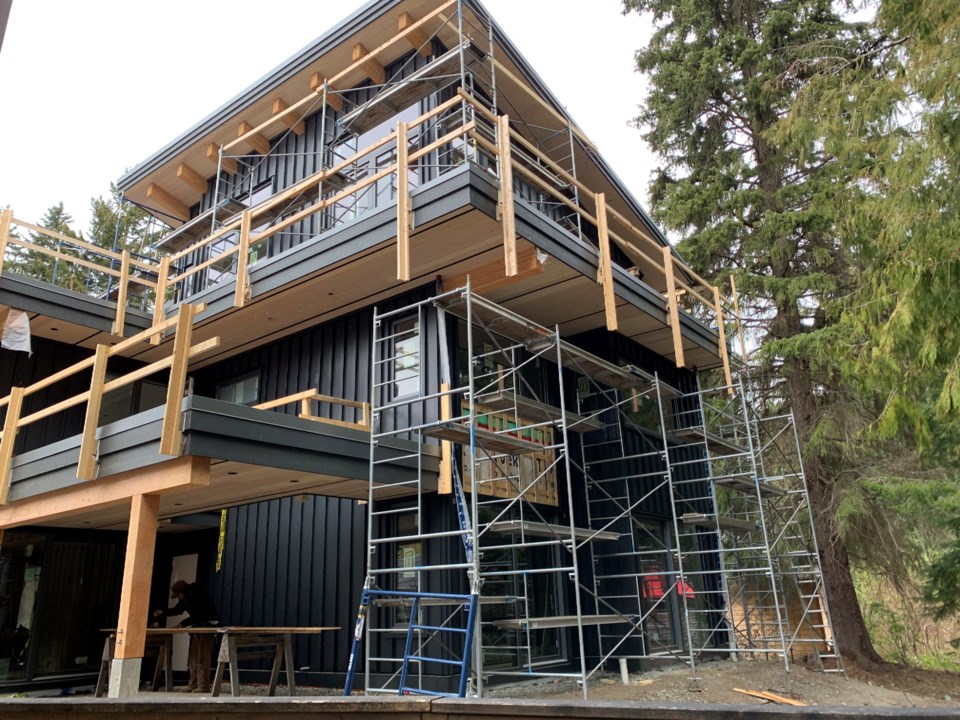The cost of applying for a variance in Whistler is set to rise significantly.
On Dec. 19, Whistler’s mayor and council voted to update the Resort Municipality of Whistler’s Board of Variance (BOV) bylaw, including changes which will see the application fee increase from $800 to $4,000 per submission.
The BOV is a quasi-judicial body independent from the Resort Municipality of Whistler (RMOW) council that exists to consider minor variances to local zoning bylaws. Applications that come before it must be minor, and adhering to the relevant bylaws without a variance must be considered undue hardship on the applicant.
According to a staff report to council, the most common applications considered by the BOV are to do with the zoning and parking bylaw—often in regards to setbacks and structure heights.
In her presentation at the Dec. 19 council meeting, planning analyst Lindsay Clarke said the BOV bylaw changes bring it in line with the land-use procedures and fees bylaw, which was updated in 2022.
“Overall, these changes will result in more clarity with administering the board, and more flexibility within the planning department, which will enable management to utilize staff resources more efficiently,” said Clarke.
Besides bureaucratic housekeeping and tidying up of the bylaw (which was last updated in 2015), the public-facing changes include removing a self-imposed deadline on the BOV to consider any applications within 35 days of submission and the previously mentioned increase in the fees associated with submitting an application.
Clarke explained the increase in fees—from $800 to $4,000—is necessary for cost recovery, and a means to encourage more complete applications and more thorough submissions by raising the bar.
“[S]ome applicants don’t understand the limited powers of the board, and have the wrong impression that it’s a cheaper and faster process, and they end up submitting applications that are completely outside the jurisdiction of the board, and then need to reapply for a development variance permit,” she said.
“As you can imagine, this creates a lot of duplicate work, and it’s an inefficient use of the board, staff, and applicants’ time.”
Clarke said along with the fee increase, more information will be shared on the RMOW website to educate possible applicants on which avenue they should take in seeking a variance—whether it be a minor variance overseen by the BOV, or a variance that would require a delegated decision from staff or a council decision.
“This is an effort to get variance applications in the correct permitting path from the beginning, and avoid these inefficiencies,” said Clarke.
The $4,000 is not an arbitrary number—in her presentation, Clarke said the average cost of processing an application to the BOV is about $4,000, while a delegated variance permit is $3,500, and a non-delegated development variance permit (decided on by council) is $5,300. The costs are associated with staff time, procedural steps, public notification, feedback, agenda packages, meetings, minutes and more.
Under the new bylaw, all applications now include the possibility of a 25-per-cent refund, if the application is withdrawn prior to public notice going out. The existing bylaw allows for no refunds.
During questions, Councillor Ralph Forsyth queried whether there was any pushback on the $4,000 fee, and was told the number has not yet been shared widely.
Coun. Jeff Murl also asked about the increase, wondering whether the original $800 was way out of line in 2015 when it was adopted, or if there has been a 400-per-cent increase in staff costs. He was told the original fee was way out of line eight years ago.
Murl also asked whether the $4,000 fee will drive potential applicants away.
“I think it will do the opposite,” said Clarke.
“Anecdotally, over the last three years of the BOV… half of the applications in each year were either cancelled before they proceeded to a board meeting because the applicant understood that they were outside the jurisdiction of the board, or they went to the board and were denied.”
That last question came from Mayor Jack Crompton, who was told that under the previous system, most of the $4,000 average cost of processing a BOV application was borne by the general taxpayer, with only the $800 coming from the applicant.
“I think that properly charging for this service allows us not to be charging general property taxpayers for work being done in other peoples’ homes, and that’s important,” said Crompton in his remarks before council voted.
“This is an important cost recovery that makes a lot of sense to me.”
Council voted unanimously to support the bylaw updates. The changed fee structure will be advertised on the RMOW website, shared with the Canadian Home Builders Association’s local branch, and advertised again when the bylaw is formally adopted at a future meeting.




